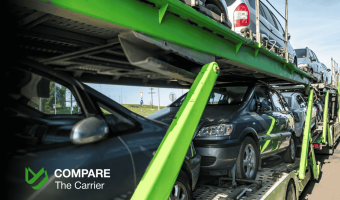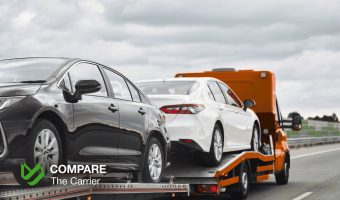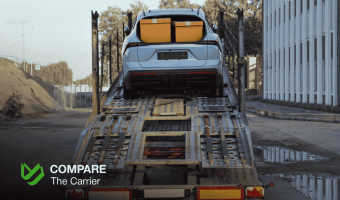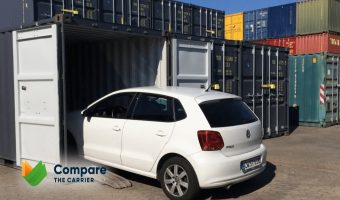In 2026, more Americans than ever are moving seasonally — and the route from Illinois to Florida is one of the busiest for personal vehicle transport. According to the Federal Highway Administration, over 900,000 seasonal migrations occur annually between the Midwest and the Southeast, with Florida being the number-one destination for snowbirds, retirees, and families relocating for the winter. If you’re considering car shipping from Illinois to Florida, you’re not alone — and you’re making a smart move by exploring your options ahead of time.
Data from the Federal Motor Carrier Safety Administration (FMCSA) shows that vehicle transport is becoming more reliable and cost-effective, thanks to improved vetting standards and digital comparison platforms like Compare The Carrier, which helps users find top-rated auto shipping companies with transparent pricing and verified customer reviews. Whether you’re a retiree headed to Fort Lauderdale, a student attending the University of Miami, or a car enthusiast purchasing a vintage vehicle from a Chicago auction — understanding the process can save you both money and hassle.
In this comprehensive guide, we’ll walk you through every step of auto transport Illinois to Florida — including pricing, timelines, preparation, and best practices. By the end, you’ll know exactly how to ship a car from Illinois to Florida with confidence, using trusted carriers that prioritize safe and fast delivery.
How Auto Transport Works from Illinois to Florida
Shipping a car from Illinois to Florida is a straightforward process — when done right. Whether you’re in Chicago, Naperville, Springfield, or Rockford, your vehicle will follow a well-established logistics route that’s popular for both seasonal and permanent relocations. This corridor sees high-volume traffic, which often translates into better availability and competitive pricing.
Step-by-Step Breakdown of the Auto Transport Process
Here’s how Illinois to Florida vehicle transport typically works:
1. Request and Compare Quotes
Using a comparison platform like Compare The Carrier allows you to gather free quotes from reliable, five-star rated carriers. You input your vehicle type, origin and destination ZIP codes, and preferred shipping dates. The system returns offers from licensed and insured companies, so you can choose the best price and service level for your needs.
Pro Tip: Look for carriers with high ratings on the Better Business Bureau (BBB), verified DOT numbers from the FMCSA, and solid customer support reviews.
2. Select the Best Carrier or Broker
You can book directly with a trusted auto transporter or through a licensed broker. (We’ll break down the pros and cons in the next section.) Either way, make sure you’re dealing with a company that specializes in cross-country car shipping from IL to FL.
3. Schedule a Pickup
Most transporters offer door-to-door or terminal-to-terminal options. Door-to-door is more convenient, though slightly more expensive. A professional hauler will schedule a time to load your vehicle at your home, apartment complex, or designated meeting point.
4. Vehicle Inspection and Loading
Before loading, the carrier performs a pre-shipment inspection, documenting the condition of your vehicle. You’ll sign a Bill of Lading, which serves as both the shipping agreement and condition report. This protects both you and the carrier in case of any transit-related issues.
5. Transport Across State Lines
Once on the trailer — open or enclosed — your vehicle begins its journey down I-57, merging with I-75 and eventually reaching your destination in Florida. Transporters usually plan optimized routes based on weather, road conditions, and other vehicles in transit.
6. Delivery and Final Inspection
Upon arrival, the driver conducts another inspection. You’ll sign off if everything checks out and your vehicle is in the same condition as at pickup. This marks the end of the delivery process.
Should You Use a Broker or Go Direct to Carrier?
One of the most common decisions people face when arranging car shipping from Illinois to Florida is whether to work directly with a carrier or go through a broker. Each option has its own pros and cons — and understanding the difference can help you avoid delays, inflated pricing, or unresponsive service.
What’s the Difference?
- Carriers are the actual trucking companies that own and operate the transport trucks.
- Brokers are intermediaries who don’t own trucks but instead connect you with vetted carriers based on your needs, budget, and timeline.
Why Most People Choose Brokers
Over 70% of customers use brokers to ship a car from Illinois to Florida, and for good reason. Here’s why:
Greater Access to Options
Brokers have access to a large network of FMCSA-licensed carriers. This allows them to match your shipment with a transporter that’s already running the IL–FL route, which often results in faster scheduling and lower prices.
Price Competition
Since brokers post your job to a national load board (like Central Dispatch), carriers bid for your transport. This often results in a lower Illinois to Florida car shipping cost than if you contacted a single carrier directly.
Customer Advocacy
Reputable brokers act on your behalf. If something goes wrong — a delay, a miscommunication, or a price dispute — your broker steps in. This is especially helpful if you’re a first-time shipper unfamiliar with the auto transport world.
Time-Saving
Instead of calling around to 10 different companies, a broker does the legwork for you — verifying insurance, confirming availability, and ensuring that you only deal with rated, reliable transporters.
When Going Direct Makes Sense
In some cases, working directly with a trusted auto transporter may be a good option — particularly if you:
- Already know a reliable carrier with great customer support.
- Are transporting multiple vehicles and have a flexible timeline.
- Have unique vehicle needs (e.g., exotic, luxury, or oversized vehicles requiring custom handling).
What to Watch Out For
Whether you choose a broker or a carrier, there are red flags to avoid:
- Companies without a valid USDOT number (check at FMCSA.gov).
- Low-ball quotes that seem too good to be true (they often are).
- No contract or vague terms on pickup/delivery.
“I initially contacted a local carrier who couldn’t give me an exact date. After a week of waiting, I used Compare The Carrier to find a broker. They placed my request that same day and had my vehicle picked up 48 hours later by a top-rated hauler.”
— Ben S., Car Dealer, Bloomington IL
Bottom line: for most people, especially snowbirds, families, and seasonal movers, using a broker offers the best combination of flexibility, value, and peace of mind. The key is working through a reputable platform like CompareTheCarrier that connects you with licensed, five-star reviewed professionals.

Cost to Ship a Car from Illinois to Florida
Understanding the Illinois to Florida car shipping cost is one of the most important parts of planning your move or seasonal relocation. While pricing can vary depending on several factors (which we’ll explore in the next section), knowing the average range can help you budget effectively — and avoid being overcharged.
Average Cost Breakdown in 2026
As of early 2026, here are the average rates to ship a car from Illinois to Florida:
| Vehicle Type | Open Transport | Enclosed Transport |
| Sedan (e.g., Toyota Camry) | $800 – $1,100 | $1,200 – $1,500 |
| SUV (e.g., Ford Explorer) | $900 – $1,250 | $1,300 – $1,700 |
| Truck (e.g., Ram 1500) | $1,000 – $1,400 | $1,400 – $1,900 |
| Classic/Luxury Car | Not recommended | $1,500 – $2,000+ |
These prices reflect door-to-door transport between major cities like Chicago and Miami, Tampa, or Orlando. Rural pickups or drop-offs may cost slightly more due to limited accessibility.
Factors That Influence These Rates
- Distance: The journey from Illinois to Florida is roughly 1,000–1,300 miles, depending on exact locations. The longer the distance, the higher the base cost.
- Type of trailer: Open transport is the industry standard and more economical. Enclosed transport costs 30–60% more but offers added protection.
- Vehicle size and weight: Larger vehicles take up more space on a trailer and cost more to ship.
- Season: Prices are typically higher during snowbird season (October–April) due to increased demand.
- Fuel prices: In 2026, diesel costs have fluctuated, directly impacting carrier rates.
- Delivery speed: Expedited delivery adds 15–25% to the final bill.
Real Market Data
According to data from Montway Auto Transport, one of the largest brokers in the U.S., the average cost to ship a car from IL to FL was approximately $1,000 in Q1 2026, with slight increases expected as we head into peak summer months.
FMCSA-registered carriers must also carry cargo insurance — so part of your quote covers that protection..
What Affects the Final Shipping Price?
If you’re planning auto transport from Illinois to Florida, understanding what drives the final cost can help you make smart decisions — and potentially save hundreds of dollars. While pricing calculators give you a ballpark estimate, several variables come into play when the rubber meets the road.
1. Distance and Route Specifics
While the straight-line mileage between Chicago and Miami is about 1,350 miles, the actual car shipping route from IL to FL may vary depending on road conditions, detours, and other vehicles on the hauler. The farther your delivery point is from a major interstate, the more expensive it will be.
- Example: Shipping from Rockford, IL to Jacksonville, FL might cost $950, while a route from Springfield, IL to Naples, FL could be $1,200 due to fewer direct lanes and limited terminal access.
2. Vehicle Type, Size & Weight
Larger or heavier vehicles (think trucks, SUVs, lifted Jeeps) occupy more trailer space and require different loading configurations. This can increase the Florida car delivery from Illinois cost.
- Compact cars are cheaper (more cars fit on one hauler).
- Inoperable vehicles (non-running) cost more due to winch requirements.
3. Transport Type: Open vs. Enclosed
We’ll explore this in more depth later, but for now:
- Open carriers are the industry standard and most cost-effective.
- Enclosed carriers offer better protection from weather and debris, ideal for classic, luxury, or exotic cars — but can add 40–60% to your cost.
4. Season and Timing
Shipping demand peaks in snowbird season (fall and spring), causing prices to surge. Planning your Illinois car shipping for early fall or late spring may help you snag lower rates.
- Winter demand = higher cost
- Flexible pickup windows = better deals
5. Pickup and Drop-off Flexibility
Door-to-door delivery is convenient but can be pricier than terminal-to-terminal service. Rural or hard-to-reach areas also come with additional fees.
- Urban to urban (Chicago to Orlando) is cheaper than rural to rural (Peoria to Port St. Joe).
6. Fuel Costs
Fuel is one of the biggest operating expenses for carriers. In 2026, diesel prices have fluctuated between $3.85 and $4.25 per gallon nationally, impacting all forms of cross-country car shipping Illinois to Florida.
7. Carrier Availability
When trucks are scarce — such as during storms, holidays, or industry backlogs — prices go up. Booking early through a broker or comparison platform helps lock in better rates.
8. Insurance and Licensing
Legitimate carriers must be FMCSA-compliant and carry cargo insurance, which is factored into your quote. Never choose an uninsured or non-licensed provider to cut costs — it’s simply not worth the risk.

Timeline: How Long Does It Take to Ship a Car from Illinois to Florida?
Once you’ve locked in your transporter, the next big question is: how long will it take for my car to arrive in Florida? The good news is that car shipping from Illinois to Florida is one of the most efficient long-distance routes in the U.S. auto transport network — especially with the high volume of demand between the two states.
Typical Transit Time: 3 to 6 Days
For standard auto transport Illinois to Florida, most carriers quote 3 to 6 days from pickup to delivery. This applies to major city routes such as:
- Chicago, IL to Orlando, FL – ~3–4 days
- Springfield, IL to Tampa, FL – ~4–5 days
- Naperville, IL to Miami, FL – ~5–6 days
This range depends on several variables including pickup time, route traffic, and weather conditions.
Factors That Influence Delivery Time
Here’s what can make your delivery faster — or slower:
Distance & Route Optimization
While the direct route from Illinois to Florida is roughly 1,200–1,400 miles, haulers often consolidate loads for efficiency. Your car may be one of 7–10 on a trailer with staggered delivery points.
Pickup Window
If you need your vehicle picked up on a specific date, expedited service is available — but for a premium. Flexible pickup windows can lead to quicker transport at lower cost since carriers can fit you into their existing route.
Weather & Road Conditions
Severe storms in the Midwest or Southeast can slow down delivery, especially during hurricane season in Florida or winter storms in Illinois. FMCSA safety regulations also limit driving hours per day to prevent driver fatigue, which can slightly extend delivery time during bad weather.
Type of Transport
Enclosed transport carriers are fewer and may take slightly longer to schedule compared to open carriers, especially if you’re outside a major metro area in Illinois.
Real-World Example:
“I had my car shipped from Champaign, IL to West Palm Beach, FL using an open carrier found via CompareTheCarrier. It was picked up on a Thursday morning and delivered by Monday afternoon — just four days, and in perfect condition.”
— George M., Retired Navy OfficerIf you’re relocating on a tight schedule, be sure to communicate your timeline clearly when booking. Reputable carriers and brokers — especially those listed on platforms to compare vehicle transport prices — will give you realistic delivery estimates and offer tracking support throughout the process.
How to Prepare Your Vehicle for Transport
Once you’ve selected a trusted auto transporter to handle your Florida car delivery from Illinois, the next step is making sure your vehicle is ready for the journey. Proper preparation ensures a smooth pickup, reduces delays, and protects your vehicle during transit. Here’s a step-by-step checklist to follow before handing over your keys.
1. Wash Your Car
A clean car makes it easier to inspect for any existing scratches, dents, or paint chips. These details are documented in the Bill of Lading before shipping, so clarity matters.
Tip: Take high-resolution photos of all sides of the vehicle, including close-ups of existing damage. Keep them for your records.
2. Remove Personal Items
Transport carriers are regulated by the FMCSA and cannot legally transport household items in vehicles. Also, any loose objects inside your car can shift during transit and cause interior damage.
- Remove GPS units, toll tags, EZ-Passes, garage openers, and valuables.
- Empty the trunk unless your carrier allows up to 100 lbs of non-essential cargo (always confirm in advance).
3. Perform a Maintenance Check
Before your auto is loaded onto a trailer, make sure it’s in safe operating condition. While it won’t be driven long distances, it does need to be operable for loading and unloading.
Check:
- Battery charge and secure mount
- Tire pressure (avoid flats during loading)
- Fluid leaks (address any leaks that could damage other cars)
- Alarm system (disable it or provide instructions to the driver)
If your car is inoperable, let your carrier know beforehand. Special equipment (like winches) is required, and this will affect pricing.
4. Fuel Level
Keep the gas tank at about ¼ full. This is enough for loading/unloading but keeps the car’s weight down — which carriers appreciate and sometimes even require.
5. Document and Confirm
- Sign the pre-shipment inspection report with the driver.
- Keep your Bill of Lading — it’s the legal document outlining the vehicle’s condition and shipping terms.
- Confirm delivery contact information and provide alternate numbers if needed.
6. Lock the Vehicle
Once loaded, the vehicle should be locked securely. Only the carrier will need access (and only if explicitly required), so you don’t need to leave keys inside unless instructed.
Proper prep = smoother delivery. Carriers appreciate well-prepared vehicles, and you’ll reduce the chances of any delivery hiccups.
Open vs Enclosed Auto Transport: Which One Is Right?
TOne of the most important decisions when booking car shipping from Illinois to Florida is choosing between open and enclosed auto transport. The right option depends on your vehicle’s value, your budget, and your comfort with exposure to the elements. Here’s how the two compare:
Open Auto Transport (Standard Option)
This is the most common — and affordable — method for cross-country car shipping Illinois to Florida. Vehicles are transported on open-air, multi-car trailers (typically 7–10 cars per load), similar to what you see delivering cars to dealerships.
Pros:
- Cost-effective: Typically 30–60% less than enclosed transport.
- Faster scheduling: More open carriers are available on IL–FL routes.
- Ideal for most vehicles: Sedans, SUVs, trucks, daily drivers.
Cons:
- Exposed to weather, dust, and road debris.
- Not recommended for luxury, exotic, or vintage cars.
Example Price: Chicago to Miami on an open trailer – approx. $950 for a standard sedan.
Enclosed Auto Transport (Premium Option)
Enclosed transport uses covered trailers to shield your car from the environment. These carriers typically haul fewer vehicles (2–6), offering more individualized attention — and protection.
Pros:
- Maximum protection: No exposure to rain, snow, road grime, or debris.
- Ideal for high-value cars: Luxury, exotic, antique, show cars.
- Added security: Less visible during transit, reducing theft risk.
Cons:
- Higher cost: Usually 40–60% more than open transport.
- Longer wait times: Fewer enclosed carriers available, especially in rural IL.
Example Price: Naperville to Orlando on an enclosed carrier – approx. $1,500 for a sports car.
Which One Should You Choose?
| Scenario | Recommended Option |
| Shipping a Honda Civic for winter in FL | Open |
| Moving a restored 1967 Mustang to Naples | Enclosed |
| Buying a Tesla Model S from a Chicago dealer | Enclosed |
| Relocating a family SUV for seasonal travel | Open |
Industry Insight: According to the National Highway Traffic Safety Administration (NHTSA), damage claims from open carriers are rare — affecting fewer than 5% of all shipments annually, and usually minor (e.g., scratches or dust buildup).Ultimately, if your vehicle is worth under $75,000 and isn’t show-ready, open transport is the most practical option for most people. For those who demand the highest level of care, enclosed carriers provide peace of mind — at a premium.
Delivery from Illinois to Florida: What to Expect
Once your vehicle hits the road, the final stage of Illinois to Florida vehicle transport is delivery — and it’s just as important as the pickup. Whether you’re having your car delivered to a beachfront condo in Naples or a student apartment in Gainesville, understanding what to expect at drop-off helps you plan ahead and avoid surprises.
How Delivery Works
Your carrier will contact you 12 to 24 hours before arrival to confirm delivery time and location. Door-to-door service is standard for most transports, meaning the hauler will bring your vehicle directly to your home, apartment, or another convenient location — as long as the street allows it.
Note: If the delivery location has size or clearance restrictions (like gated communities, narrow streets, or city ordinances), you may be asked to meet the driver at a nearby parking lot or accessible area.
Final Inspection Process
Just like during pickup, the driver will perform a post-transport inspection of the vehicle.
Here’s what you should do:
- Carefully inspect the exterior and interior for any new damage.
- Compare it with the pre-shipping photos and Bill of Lading notes.
- Don’t rush — this is your opportunity to document any discrepancies.
- Sign the delivery report only when satisfied.
If any issues arise, note them clearly on the Bill of Lading before signing and contact your carrier or broker immediately. Most top-rated auto shipping companies have cargo insurance that covers damage sustained during transport — though damage is extremely rare.
Delivery Timing
Most cars are delivered within 3–6 days of pickup, depending on the starting point in Illinois and your final destination in Florida. Delays are rare but possible due to:
- Severe weather (especially during Florida’s rainy season)
- Mechanical issues
- Traffic or road closures
CompareTheCarrier.com partners only with reliable carriers that communicate throughout the transport process — so you’ll always know where your vehicle is and when it’s expected.
Real Delivery Example:
“We had our BMW X3 delivered from Evanston, IL to Boca Raton. The driver called us the day before and then again an hour out. He met us in a Publix parking lot nearby since our condo had height restrictions. Smooth, professional, and zero issues!”
— Donna W., Snowbird, Verified Review
Why Compare The Carrier Is the Smart Choice
With dozens of transport companies claiming to be the best car shipping company, it can be overwhelming to know who to trust — especially when the stakes involve your car, time, and money. That’s where Compare The Carrier comes in. As a platform built specifically to streamline and simplify car shipping from Illinois to Florida, it connects you with only licensed, rated, and reliable carriers — no gimmicks, no guesswork.
Here’s why thousands of users are choosing Compare The Carrier for auto transport from Illinois to Florida:
1. Transparent Price Comparison
CompareTheCarrier lets you instantly compare quotes from FMCSA-certified carriers without having to call five different companies or fill out endless forms. You get a clear breakdown of services, pricing, pickup windows, and reviews — all in one dashboard.
Benefit: No hidden fees. No lowball offers that get revised later. Just real, competitive pricing from vetted pros.
2. Only Licensed and Insured Carriers
Every transporter listed on Compare The Carrier is fully vetted:
- FMCSA registration
- Active DOT number
- Required cargo and liability insurance
- Clean track record with the Better Business Bureau
This means you can avoid common pitfalls — like rogue carriers or shady pop-up operations that cut corners on safety and service.
3. Verified Five-Star Reviews
CompareTheCarrier uses only authentic, verified reviews from real customers — so you know you’re getting the inside scoop on everything from punctuality to customer support.
“I used CompareTheCarrier to book enclosed transport for my Corvette. The process was smooth, fast, and cheaper than what I was quoted elsewhere. The hauler was professional, and my car arrived without a scratch.”
— Brent D., Naples, FL
4. Dedicated Customer Support
From booking to delivery, CompareTheCarrier’s team of transport experts is available to answer questions, help with documentation, and step in if anything goes wrong.
- Need help comparing enclosed vs. open?
- Want to request a flexible pickup window?
- Don’t know what to do about HOA access restrictions?
The support team is there for you — before, during, and after transport.
5. Built for Every Type of Customer
Whether you’re a:
- Snowbird relocating to Florida for winter,
- Student moving to college,
- Car dealer shipping inventory,
- Retiree moving full-time,
- Or family relocating permanently.
CompareTheCarrier is built to accommodate all of these needs — with options for standard, expedited, enclosed, and specialty transport.
6. Savings Without Sacrificing Quality
By putting carriers in direct competition for your business, Compare The Carrier helps drive down your Illinois to Florida car shipping cost — without sacrificing safety or service.
Why It Matters
In 2026, scams and fly-by-night shipping companies are still a risk. FMCSA reports show hundreds of consumer complaints each year related to pricing deception, no-shows, or damage disputes. CompareTheCarrier’s curated carrier network eliminates those risks by filtering out unqualified providers.
Whether you’re planning a single relocation or frequently arranging auto transport, using a trusted Vehicle Shipping Calculator provides the clarity and support you need — helping you move your car safely, affordably, and without the guesswork.
Conclusion: Smooth Shipping, from Illinois to Florida Arrival
Organizing car shipping from Illinois to Florida doesn’t have to be complicated, risky, or expensive — not when you understand the process and use the right tools to your advantage.
From exploring transport options and comparing quotes to prepping your vehicle and understanding delivery logistics, you now have the complete roadmap for safe and affordable auto transport from IL to FL. Whether you’re a seasonal traveler heading south for the winter, a student moving to campus, or a dealer relocating inventory, the key to a smooth experience is planning ahead and choosing a trusted partner.
And that’s exactly where Compare The Carrier shipping tool shines. As a transparent, easy-to-use platform, it allows you to:
- Compare real quotes from top-rated auto shipping carriers
- Read verified reviews from customers just like you
- Avoid hidden fees and lowball bait-and-switch offers
- Book with confidence, knowing every transporter is licensed, insured, and FMCSA-compliant
With demand for cross-country car shipping from Illinois to Florida continuing to rise in 2026, now is the time to get ahead — not just by finding the cheapest rate, but by selecting a reliable carrier who will deliver your vehicle with care and professionalism.
Final tip: The earlier you book, the more flexibility and savings you’ll enjoy. Start by using CompareTheCarrier’s free quote tool — and take the first step toward a worry-free transport experience.
FAQ
To make your decision even easier, we’ve compiled answers to the most common questions about car shipping from Illinois to Florida. Whether you’re a first-timer or a seasoned shipper, this section will help clarify everything from pricing to preparation.
How much does it cost to ship a car from Illinois to Florida?
The average cost ranges from $900 to $1,300 for standard open transport. Enclosed shipping for luxury or classic vehicles may cost $1,400 to $2,000+ depending on vehicle type, route, and time of year.
How long does it take to ship a car from Illinois to Florida?
Most deliveries take 3 to 6 days once your vehicle is picked up. Rural areas or enclosed carriers may add 1–2 days.
Is it safe to ship my car across the country?
Yes — especially if you book through a vetted platform like CompareTheCarrier.com. All carriers listed are FMCSA-licensed, insured, and reviewed by real customers. Open carriers are safe for most vehicles; enclosed carriers offer added protection.
Should I use a broker or book directly with a carrier?
Brokers typically offer more options, better pricing, and faster scheduling, especially for high-demand routes like Illinois to Florida vehicle transport. Booking through a comparison platform ensures you’re connected only to reliable, rated carriers.
Can I ship personal items inside the car?
Generally, no. FMCSA regulations prohibit the transport of household goods. Some carriers may allow up to 100 lbs of items in the trunk, but always ask first.
What documents are required to ship my car?
Usually just your vehicle registration, photo ID, and proof of insurance. You’ll also sign a Bill of Lading at pickup and delivery to confirm vehicle condition.
Do I need to be present for pickup and delivery?
Yes, or you can authorize a trusted person (18+) to sign the paperwork and inspect the vehicle on your behalf.
What if my car gets damaged during shipping?
All carriers must carry cargo insurance. If damage occurs, document it immediately on the Bill of Lading, take photos, and file a claim with the carrier. Using a platform like CompareTheCarrier helps you work only with insured professionals.
When is the best time to ship a car to Florida?
Avoid peak snowbird season (late fall and early spring) for the best rates. Summer and early fall tend to offer more availability and lower costs.
Can I cancel or reschedule my shipment?
Most companies allow cancellation with notice, though fees may apply. Be sure to review the carrier’s cancellation policy before booking.
Do I pay the full amount upfront?
Typically, no. Most companies charge a small deposit upfront, with the remainder due upon delivery (via cash, cashier’s check, or other methods).
What types of vehicles can be shipped?
Everything from sedans, SUVs, and trucks to motorcycles, vans, and even non-running vehicles — as long as it fits the hauler and requirements are communicated upfront.
Is shipping a car cheaper than driving it myself?
It can be — especially when you factor in gas, lodging, meals, wear and tear, and time off work. Shipping also avoids the stress of long-distance driving.
Can I track my vehicle while it’s in transit?
Yes. Many carriers offer GPS tracking or regular driver updates. When you book through CompareTheCarrier.com, you can also contact customer support for status updates at any time.

















